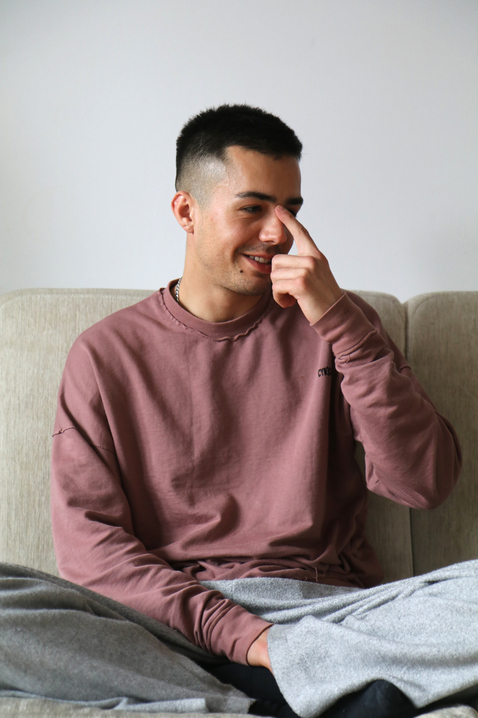Maksim / Anton Shebetko, Ukraine
“I was born in Crimea, I spent my childhood behind Yevpatoria, in a small village – Shtormovoe. Later, I moved to the central part of Simferopol, and at the end of 2014 I moved to Lviv.
When I was growing up, I didn’t really know the word “gay,” let alone what it meant. I had a best friend, Vitya, and at some point I wanted not only to go smoking and drinking with him, but to hug him and kiss him. I thought I loved him like a friend. I didn’t have any information then. I didn’t know how to describe what I felt.
At first, it was incomprehensible and scary, and then, when I moved to Simferopol, they started bullying me. I understood that I was gay, but denied it for a long time. I grew up in a heteronormative world. There were many different romantic stories around. I thought I was being punished for something. Why can’t I be normal? Why can’t I love a girl? Why can’t I get married and have a baby?
I hated myself a lot, tried to change, tried to date girls. My nature and the fact that I am gay seemed very nasty to me up to the age of 17, until I had my first boyfriend in Lviv. He showed me that it’s possible to be happy and complete despite being gay. Before that, it seemed to me that this was some kind of deviation from the norm, and everyone convinced me of this.
In Lviv, we were an open couple. Wwe could easily walk hand in hand down the street, although not always, and not everywhere. I was afraid of this, but often, my boyfriend took my hand and said that if someone attacks us, then we will defend ourselves. Perhaps that is why I did not feel any homophobia in Lviv.
My mother reacted negatively to my coming out. When I confessed to her, she categorically refused to let me go to Lviv to see my boyfriend, hid my documents and wouldn’t let me leave home. It seems to me that she still has not come to terms, but at least we began to communicate. We did not communicate for a long time; several years.
Now she does not ask me about anything, does not want to hear about it, immediately changes the subject or simply ignores me. I am very close to my mother, we communicate every day, help each other physically and morally, but at the same time, a huge, important layer of my life is simply not discussed, not supported.
In 2018, I took part in the project “Ukrainian Top Model.” There I came out for the whole of Ukraine.
I was not going to come out, but at the first casting they began to persuade me to tell. I was then 19 or 20 years old. I did not resist professional psychologists and they convinced me that I needed it. In fact, they were right and it helped me a lot.
On the project itself, I had to deal with bullying. There were a lot of fights and conflicts. But it was all done for the sake of some dramatic moment on the air. Actually, all the moments with bullying were built in such a way as to somehow refute it, to oppose bullying. At the same time, there was no real homophobia from the participants themselves. The meaning of all of this was theatrics. We played, and all the fights were, in fact, staged.
I, in my life, never knew real homophobia, only from my family: mothers, grandmothers. And then, I do not blame them, because I was born in a Georgian family. My mother, grandfather and grandmother were born in Tbilisi. It’s all hard for them.
My coming out is the most positive result of my participation in a reality show. Having confessed to the whole of Ukraine that I was gay, I lived in Kyiv for 2.5 years and no one ever approached me, did not say anything bad. I helped many other people. I was able to broadcast my ideas and values to one hundred thousand people on Instagram.
About war. When the occupation took place, I was in my first year at the university. I studied for six months and was very inspired by it, but then, when the government changed, the teaching staff changed and so I had to leave the university.
Before that we were engaged in creativity, but after the occupation, a lot of corruption appeared at the university itself. We had a separate office at the university where Russian passports were issued. I had a friend from Melitopol and he was told that if you do not change your documents to Russian ones, then you will be expelled or sent back to Melitopol.
When I grew up in the Ukrainian Crimea, it seemed to me that there were other people there. Everything had a soul and the whole holiday season seemed magical; all people were positive, cheerful. People have changed a lot, the attitude towards the peninsula itself has changed even among the locals – it has become more consumerist.”




